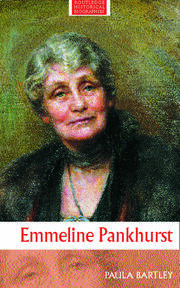304 Pages
by
Routledge
312 Pages
by
Routledge
304 Pages
by
Routledge
Also available as eBook on:
In this well-structured, fluent and lively account, Paula Bartley uses new archival material to assess whether Pankhurst should be seen as a heroine or a tyrant, a conservative or a progressive.
Emmeline Pankhurst was the most prominent campaigner for the women's right to vote and was transformed into a popular heroine of the early twentieth century. Early in life she was attracted to socialism, she grew into an entrenched and militant suffragette and ended up as a Conservative Party candidate.
This new biography examines the guiding principles that underpinned all of Emmeline Pankhurst's actions, and places her achievements within a wider social and political context.
Introduction: Principles before politics PART I A POLITICAL APPRENTICESHIP 1858–1903 1 Shaping a life 1858–80 2 The Liberal years 1880–94 3 The ILP years 1894–1903 PART II THE SUFFRAGETTE STORY 1903–14 4 Suffragette beginnings 1903–07 5 Deeds and words 1908–09 6 Deeds not words 1910–12 7 The height of militancy 1913–14 8 International fund-raising 1909–13 PART III LIFE AFTER THE VOTE 1914–28 9 The First World War 1914–18 10 Life after the war 1918–28
Biography
Paula Bartley
'Paula Bartley provides us with the feminist biography of Pankhurst for which we have been eagerly waiting.' - Harold L. Smith, University of Houston, Victoria.
'...this is a very useful and accessible text for both student and teacher. Her research is thorough and far reaching and leaves few unanswered questions about Emmeline Pankhurst.' - Susan Johnson, Women's History Magazine, June 2003




